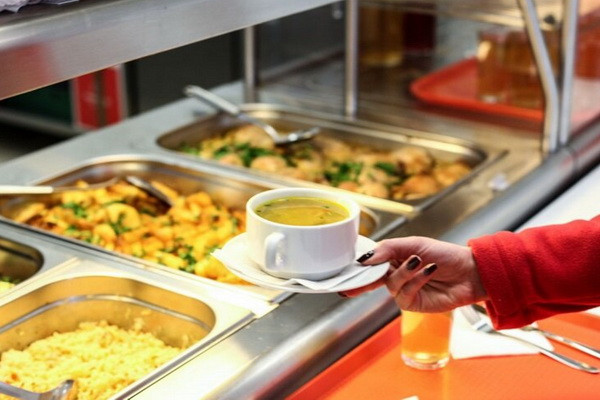
Ministry of Justice: Public catering needs reforms
Tashkent, Uzbekistan (UzDaily.com) -- The Ministry of Justice has studied the regulation of public catering. In the course of the study, surveys were conducted among 2.1 thousand representatives of public catering enterprises, legal and technical acts regulating this area, including statistical and other data from government agencies, were analyzed.
The analysis showed a number of problems in this area that need to be addressed as soon as possible.
First is outdated legislation.
Regulatory and technical acts regulating this area are outdated and do not correspond to the practice of modern business. For example, a restaurant must post a notice a week before closing for cleaning, repairs, and other work. In case of non-compliance with this rule, the restaurant is imposed a fine of 2 million soums.
In addition, sanitary rules and norms in the field of catering services (SanPiN 0309-14) also do not meet modern requirements, as a result of which it has become impossible to follow twenty of them.
In particular, dishes cannot be cooked on stoves with coal, wood, solid fuel (this requirement cannot be met if the gas supply is limited in winter). Another example is that there should be separate knives for 12 types of food (in practice, most food service establishments do not use separate knives for each product).
Secondly, the tax burden and complex tax administration.
Public catering organizations pay 7-9 types of taxes. In particular, turnover tax (turnover up to 1 billion soums), value added tax, income tax, social tax, personal income tax, property tax, land tax, tax for the use of water resources, a fee levied for the right to sell alcoholic products (when selling alcoholic products).
According to the survey, the high tax burden forces 61% of catering establishments to evade taxes.
In addition, the payment of different types of taxes in itself complicates the tax administration in relation to them: the company must pay taxes for 6 different periods of time, as well as submit tax reports for 5 different periods of time.
Thus, almost 1/3 of the respondents experience difficulties in understanding tax legislation in the course of their activities.
In turn, these factors lead to a high (30-40%) share of the shadow economy in the industry.
Thirdly, numerous checks.
Public catering enterprises are constantly disturbed by more than 10 state bodies (tax, fire, sanitary, labor, law enforcement agencies, housing and communal services, etc.).
In 2020-2021, about 8,000 inspections were carried out by three departments (tax, fire, sanitary). That is, an average of 14.5% of public catering establishments are checked annually.
However, representatives of enterprises participating in the survey expressed a different opinion, that is, 2.1 thousand respondents noted that 3 inspections were carried out monthly, which shows that the actual number of inspections is 5.5 thousand per month, as well as the presence of cases illegal check.
Entrepreneurs of the industry said that most inspections are carried out by tax authorities, then by sanitary and fire supervision authorities, law enforcement agencies (mainly for the suspension of activities at night).
Fourth, cases of corruption during inspections.
The rules governing this area are complex, and therefore there may be violations in the activities of catering establishments. These violations entail checks, which can later lead to corruption. For example, 26.4% of respondents (905) stated that they had encountered cases of corruption in tax, 20.3% (697) in sanitary and 11.3% (387) in fire control authorities, and also noted that the most common a type of corruption is the free service of employees of state bodies.
Fifth, problems with connection to engineering and communication networks and interruptions in the supply of gas, electricity and water.
63.4% of the interviewed representatives of public catering enterprises emphasized that at the beginning of their activities they faced problems related to connecting to infrastructure facilities.
Supply disruptions also remain a common occurrence for them. In particular, 36.3% (766 people) of the respondents have problems with water supply, 35.2% (742 people) with gas supply, 28.5% (602 people) with electricity.
Sixth, informal hiring of workers.
As a rule, restaurants, cafes and kitchens hire such workers as cooks, waiters, cleaners, by verbal agreement without concluding an employment contract.
According to the State Statistics Committee, more than 300,000 people work at public catering establishments, of which more than 200,000 or 2/3 work unofficially.
Of course, the informal involvement of labor resources is not beneficial both for enterprises (because there is a risk of imposing an administrative fine) and for employees (because labor rights are not guaranteed). In addition, this phenomenon is also unfavorable for the state, because due to non-payment of social and income taxes, the state budget is underreceived.
In particular, the respondents answered that they informally paid their employees an average of 1.8 million soums per month. After analyzing these data, we can conclude that about 1.6 trillion soums (social and income tax) annually do not enter the state budget.
The above problems can be emphasized, as the main catering enterprises have other problems besides them (high need for cash to buy food, rental costs, etc.).
While we want to make great strides in the tourism industry, these issues are holding back the industry from developing to its full potential.
The quality and development of public catering services will certainly attract the attention of foreign tourists, and the existing problems in the field of "chain reaction" hinder the development of tourism.
For this reason, the Ministry of Justice has developed proposals to address these issues and sent them to the relevant authorities.